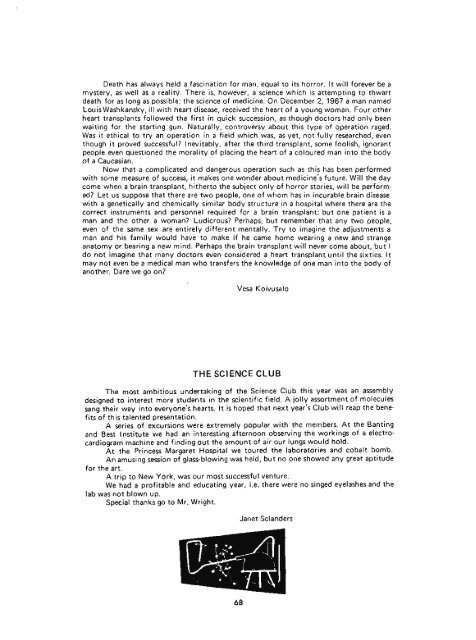1968 Magnet Yearbook
1968 Magnet Yearbook
1968 Magnet Yearbook
Create successful ePaper yourself
Turn your PDF publications into a flip-book with our unique Google optimized e-Paper software.
Death has always held a fascination for man, equal to its horror. It will forever be a<br />
mystery, as well as a reality. There is, however, a science which is attempting to thwart<br />
death for as long as possible; the science of medicine. On December 2, 1967 a man named<br />
louisWashkansky, ill with heart disease, received th e heart of a young woman. Four other<br />
heart transplants followed the first in quick succession, as though doctors had only been<br />
waiting for the starting gun. Naturally, controversy about this type of operation raged.<br />
Was it ethical to try an operation in a field which was, as yet, not fully researched, even<br />
though it proved successful? Inevitably, after the third transplant, some foolish, ignorant<br />
people even questioned th e moral ltv of placing the heart of a colou red man into the body<br />
of a Caucasian.<br />
Now that a complicated and dangerous operation such as this has been performed<br />
with some measure of success, it makes one wonder about medicine's future. Will the day<br />
come when a brain transplant, hitherto the subject only of horror stories, will be performed?<br />
let us suppose that there are two people, one of whom has in incurable brain disease<br />
with a genetically and chemically similar body structure in a hospital where there are the<br />
correct instruments and personnel required for a brain transplant; but one patient is a<br />
man and the other a woman? ludicrous? Perhaps, but remember that any two people,<br />
even of the same sex are entirely different mentally. Try to imagine the adjustments a<br />
man and his family would have to make if he came home wearing a new and strange<br />
anatomy or bearing a new mind. Perhaps the brain transplant will never come about, bu t I<br />
do not imagine that many doctors even considered a heart transplant until the sixties. It<br />
may not even be a medical man who transfers the knowledge of one man into the body of<br />
another. Dare we go on?<br />
Vesa Koivusalo<br />
THE SCIENCE CLUB<br />
The most ambitious undertaking of the Science Club this year was an assembly<br />
designed to interest more students in the scientific field. A jolly assortment of molecules<br />
sang their way into everyone's hearts. It is hoped that next year's Club will reap the benefits<br />
of this talented presentation.<br />
A series of excursions were extremely popular with the members. At the Banting<br />
and Best I nstitute we had an interesting afternoon observing the workings of a electrocardiogram<br />
machine and finding out the amount of air our lungs would hold.<br />
At the Princess Margaret Hospital we toured the laboratories and cobalt bomb.<br />
An amusing session of glass-blowing was held, but no one showed any great aptitude<br />
for the art .<br />
A trip to New York, was our most successful venture.<br />
We had a profitable and educating year, i.e. there were no singed eyelashes and the<br />
lab was not blown up.<br />
Special thanks go to Mr. Wright.<br />
Janet Sclanders<br />
68














